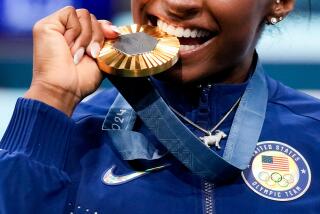A Dash of Controversy
- Share via
ATHENS — As swiftly as the fastest men in the world ran in the Olympic 100-meter final -- and Justin Gatlin of the U.S., Francis Obikwelu of Portugal and Maurice Greene of the U.S. led five finishers home in less than 10 seconds -- they could not outrun the specter of the doping scandal that has enveloped and sullied their sport.
Moments after Gatlin crossed the finish line at Olympic Stadium in a personal-best time of 9.85 seconds and accepted the mantle of Olympic champion from a gracious Greene, Gatlin’s coach, Trevor Graham, acknowledged having prompted an investigation that mushroomed into the most significant doping scandal in U.S. Olympic history.
Graham said he was the previously unidentified coach who contacted the U.S. Anti-Doping Agency with information about a new designer steroid and sent a syringe containing the substance to USADA for testing. USADA dispatched it to the Olympic anti-doping laboratory at UCLA in June 2003, and it was identified there as tetrahydrogestrinone, or THG.
Speculation had long centered on Graham as the source of the syringe, though his motives remain unclear. At least six of Graham’s athletes have tested positive for banned substances.
After Gatlin’s victory Sunday, Graham confirmed to reporters his involvement in triggering the BALCO investigation. Asked if he believed Gatlin would have won if he, Graham, hadn’t supplied the syringe that set off the investigation, Graham told the Baltimore Sun, “I can’t predict what would have happened. I don’t know.”
His motivation, he said, was “I was just a coach doing the right thing at that time.” He added that he had no regrets.
Gatlin, 22, ran a dynamic and powerful race against the backdrop of a roaring crowd that seemed to sense it would witness a race for the ages. It was the fastest Olympic 100-meter final ever run: at the 1996 Atlanta Games, four runners were timed in under 10 seconds and another in 10 seconds flat.
Gatlin was smothered afterward by training partner and fourth-place finisher Shawn Crawford in a congratulatory hug after he leaned and edged out Obikwelu, who was timed in 9.86 seconds. Greene was timed in 9.87, the 58th sub-10-second result of his career.
As camera flashes went off and the diamond earring in his ear glistened, Gatlin dropped to his knees on the track and bowed his head.
“I knew that I had won,” said Gatlin, second to Greene at the Olympic trials last month in Sacramento. “I was just shocked that my dream had come true.”
Crawford advanced that dream by challenging Gatlin in practice -- and by keeping the mood light. They urged each other on during the last 10 meters of their semifinal, and they clasped hands and pointed at each other as they prepared for the final.
“I’m not too upset,” Crawford said. “His race was almost flawless. My race was terrible.
“That was, like, the race of his life. I’m just glad I was part of the field to push him to that. I know he’s going to carry the title of Olympic gold medalist in the 100 with honor and dignity.”
Greene, the oldest man in the eight-runner field at 32, said the best person had won. However, he said he’s not about to quit or hand over the proverbial torch to the next generation.
“Every one of us comes here to win the gold medal. Every one of us comes here to compete. I didn’t get gold but I’ve had a long run,” Greene said. “I don’t think I’ve run as fast as I can yet.
“He is up and coming, but I don’t think my time has passed. Tonight, he ran a remarkable race. You have to give it to him.”
Greene said he was “a little bit disappointed” with winning a bronze medal instead of a second straight gold, but his coach, John Smith, said it was close to a miracle that Greene was there at all in the wake of a motorcycle accident early in 2002 in which Greene broke his leg and later suffered other leg injuries while compensating for it.
“In a way, this is more important than winning in Sydney,” Smith said. “Sydney was perfect. This was not. ... I’m very happy for Justin. He’s deserving. He ran the best race of all of them.”
Gatlin said he didn’t fret about not being rated the favorite. Crawford had a world-leading 9.88 entering the race and Asafa Powell of Jamaica and Greene had each run 9.91 before Sunday. Powell, the youngest man in the field at 21, finished fifth in his Olympic debut with a sparkling time of 9.94.
“I never feel I’m the underdog. I go out feeling like a champion,” Gatlin said. “If I feel like the underdog I’m giving a percentage to the rest of the field.”
He gave away nothing Sunday. But neither did Greene, who insisted the tattoo on his arm that proclaims him to be “Greatest of All Time” remains true.
“I’ve been at this for a long time and you can put my stats up against any sprinter before me,” he said.
Crawford and LaTasha Colander, who was eighth in the women’s 100 Saturday, also are coached by Graham, who is based in Raleigh, N.C. He coached Marion Jones from 1997 through her five-medal performance at the Sydney Games and until late 2002; he also coached Tim Montgomery when Montgomery set the 100-meter world record of 9.78 seconds in 2001.
Montgomery is one of four U.S. track stars facing a lifetime ban, accused by USADA of using an array of prohibited performance-enhancing substances. Jones is under investigation by USADA but has not been charged with a doping offense and has repeatedly denied using banned substances. However, her ex-husband, C.J. Hunter, said she used banned substances before, during and after the Sydney Games. Her lawyers have said Hunter is lying.
*
Times staff writer Alan Abrahamson contributed to this report.
More to Read
Go beyond the scoreboard
Get the latest on L.A.'s teams in the daily Sports Report newsletter.
You may occasionally receive promotional content from the Los Angeles Times.







